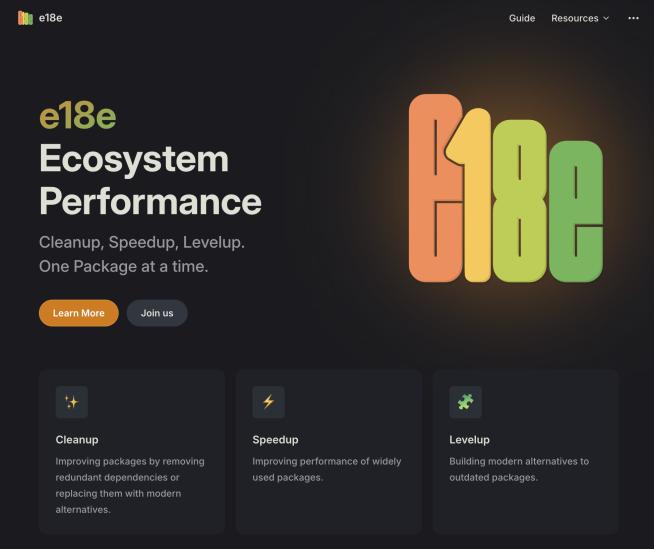


@rollup/plugin-node-resolve
🍣 A Rollup plugin which locates modules using the Node resolution algorithm, for using third party modules in node_modules
Requirements
This plugin requires an LTS Node version (v8.0.0+) and Rollup v1.20.0+.
Install
Using npm:
npm install @rollup/plugin-node-resolve --save-dev
Usage
Create a rollup.config.js configuration file and import the plugin:
import resolve from '@rollup/plugin-node-resolve';
export default {
input: 'src/index.js',
output: {
dir: 'output',
format: 'cjs'
},
plugins: [resolve()]
};
Then call rollup either via the CLI or the API.
Options
mainFields
Type: Array[...String]
Default: ['module', 'main']
Valid values: ['browser', 'jsnext', 'module', 'main']
Specifies the properties to scan within a package.json, used to determine the bundle entry point. The order of property names is significant, as the first-found property is used as the resolved entry point. If the array contains 'browser', key/values specified in the package.json browser property will be used.
module
DEPRECATED: use "mainFields" instead
Use pkg.module field for ES6 module if possible. This option takes precedence over both "jsnext" and "main" in the list if such are present.
jsnext
DEPRECATED: use "mainFields" instead
Use pkg['jsnext:main'] if possible, legacy field pointing to ES6 module in third-party libraries, deprecated in favor of pkg.module, see: https://github.com/rollup/rollup/wiki/pkg.module. This option takes precedence over "main" in the list if such is present.
main
DEPRECATED: use "mainFields" instead
Use pkg.main field or index.js, even if it's not an ES6 module (needs to be converted from CommonJS to ES6), see https://github.com/rollup/rollup-plugin-commonjs.
browser
Type: Boolean
Default: false
If true, instructs the plugin to use the "browser" property in package.json files to specify alternative files to load for bundling. This is useful when bundling for a browser environment. Alternatively, a value of 'browser' can be added to the mainFields option. If false, any "browser" properties in package files will be ignored. This option takes precedence over mainFields.
extensions
Type: Array[...String]
Default: ['.mjs', '.js', '.json', '.node']
Resolve extensions other than .js in the order specified.
preferBuiltins
Type: Boolean
Default: true
Whether to prefer built-in modules (e.g. fs, path) or local ones with the same names
jail
Type: String
Default: '/'
Lock the module search in this path (like a chroot). Modules defined outside this path will be marked as external.
only
Type: Array[...String|RegExp]
Default: null
Example: only: ['some_module', /^@some_scope\/.*$/]
modulesOnly
Type: Boolean
Default: false
If true, inspect resolved files to check that they are ES2015 modules.
dedupe
Type: Array[...String]
Default: []
Force resolving for these modules to root's node_modules that helps to prevent bundling the same package multiple times if package is imported from dependencies.
dedupe: [ 'react', 'react-dom' ]
customResolveOptions
Type: Boolean
Default: null
Any additional options that should be passed through to node-resolve.
customResolveOptions: {
moduleDirectory: 'js_modules'
}
rootDir
Type: String
Default: process.cwd()
Root directory to resolve modules from. Used when resolving entrypoint imports, and when resolving deduplicated modules. Useful when executing rollup in a package of a monorepository.
// Set the root directory to be the parent folder
rootDir: path.join(process.cwd(), '..')
Using with @rollup/plugin-commonjs
Since most packages in your node_modules folder are probably legacy CommonJS rather than JavaScript modules, you may need to use @rollup/plugin-commonjs:
import resolve from '@rollup/plugin-node-resolve';
import commonjs from '@rollup/plugin-commonjs';
export default {
input: 'main.js',
output: {
file: 'bundle.js',
format: 'iife',
name: 'MyModule'
},
plugins: [resolve(), commonjs()]
};
Resolving Built-Ins (like fs)
This plugin won't resolve any builtins (e.g. fs). If you need to resolve builtins you can install local modules and set preferBuiltins to false, or install a plugin like rollup-plugin-node-builtins which provides stubbed versions of these methods.
If you want to silence warnings about builtins, you can add the list of builtins to the externals option; like so:
import resolve from '@rollup/plugin-node-resolve';
import builtins from 'builtin-modules'
export default ({
input: ...,
plugins: [resolve()],
external: builtins,
output: ...
})
Meta
CONTRIBUTING
LICENSE (MIT)





